Michel Sidibé UNAIDS Executive Director EXD

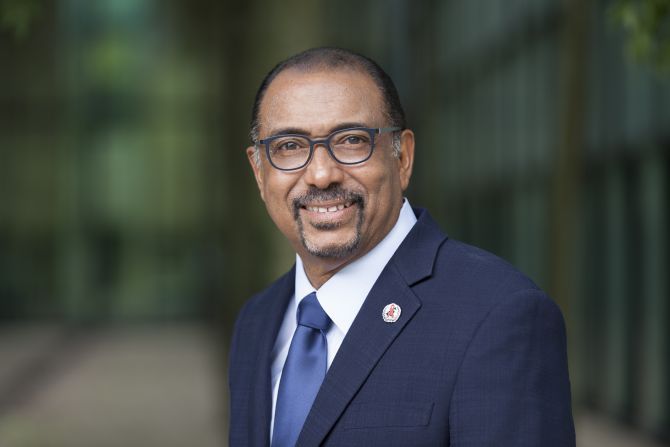
Press Statement
UNAIDS congratulates Michel Sidibé on his appointment as Minister of Health and Social Affairs of Mali
08 May 2019 08 May 2019UNAIDS extends its heartfelt thanks to the Executive Director of UNAIDS for his outstanding contribution to the global response to HIV
GENEVA, 8 May 2019—UNAIDS congratulates Michel Sidibé on his appointment as the Minister of Health and Social Affairs of Mali. Mr Sidibé served as the Executive Director of UNAIDS for more than 10 years after being appointed as the second Executive Director of UNAIDS and Under-Secretary-General of the United Nations in January 2009.
A true champion for a people-centred approach to health and development and a strong advocate for social justice, Mr Sidibé has made a remarkable contribution to the AIDS response, helping to save and improve the lives of millions of people around the world.
Since Mr Sidibé took up his position as Executive Director of UNAIDS, there has been a 170% increase in the number of people accessing antiretroviral therapy, from 8 million in 2010 to 21.7 million in 2017. There has also been a 45% drop in AIDS-related deaths—from 1.7 million in 2008 to 940 000 in 2017—and new HIV infections have been reduced by 22%—from 2.3 million in 2008 to 1.8 million in 2017.
“It has been an honour for me to serve UNAIDS as its Executive Director and contribute to the global AIDS response,” said Mr Sidibé. “I would like to thank all UNAIDS partners and staff and especially community members affected by HIV, who have made our successes possible. With their steadfast commitment and resolve, we have been able to bring life-saving services to millions of people. If we stay the course and do the right thing, always—putting people first and delivering results for people—we will succeed in ending AIDS.”
Mr Sidibé’s vision of zero new HIV infections, zero discrimination and zero AIDS-related deaths, and his tireless advocacy to ensure that all people have access to health services, have kept HIV at the top of the global agenda. His calls for global solidarity and shared responsibility have seen resources for HIV increase by more than one third, from US$ 15.9 billion in 2010 to US$ 20.6 billion in 2017 in low- and middle-income countries. His advocacy for country ownership helped to ensure that 56% of HIV resources in low- and middle-income countries now come from domestic sources, promoting long-term sustainable responses to HIV.
His commitment to the concept of universal access to HIV prevention, treatment, care and support meant that the goal of reaching 15 million people living with HIV with antiretroviral therapy by 2015 was achieved seven months ahead of schedule. His focus on the most vulnerable and marginalized has given a voice to the voiceless, including gay men and other men who have sex with men, sex workers, transgender people, people who inject drugs, prisoners and other incarcerated people, and people on the move.
A strong believer that no child should be born with HIV, his leadership in calling for the elimination of new HIV infections among children contributed to a 60% reduction in new paediatric HIV infections since 2009 in the 21 priority countries of the Global Plan towards the elimination of new HIV infections among children by 2015 and keeping their mothers alive.
During his tenure, Mr Sidibé spearheaded two of the most successful United Nations General Assembly political declarations on HIV, which named key populations and included ambitious regional and global Fast-Track Targets. He has successfully advocated to take AIDS out of isolation, encouraging a holistic human-rights based approach to include HIV as part of sexual and reproductive health and integrate responses to interlinked diseases, including tuberculosis and cervical cancer.
“I would like to thank United Nations Secretary-General António Guterres for his long-standing support to UNAIDS,” said Mr Sidibé. “I am also grateful to the United Nations system for allowing me to develop my career, from when I started as a short-term junior professional in the Democratic Republic of the Congo for the United Nations Children’s Fund in 1987 to becoming Under-Secretary-General of the United Nations some 20 years later—I am eternally thankful for the opportunities I have been given.”
The countries most affected by HIV have rallied behind Mr Sidibé’s call to reach the 90–90–90 targets, whereby 90% of people living with HIV know their status, 90% of people who know their status are accessing treatment and 90% of people on treatment have a suppressed viral load. Some 75% of all people living with HIV now know their HIV status, and focus has been increased on HIV testing and expanding antiretroviral therapy.
His call with partners to establish an HIV prevention coalition led to a new HIV Prevention 2020 Road Map to strengthen and sustain political commitment for primary HIV prevention and establish accountability for delivering services at scale in order to stop new HIV infections.
His commitment to improving the lives of women and girls galvanized action for Security Council resolution 1983 in 2011, which focused on ensuring access to HIV prevention and treatment for women and girls, on the prevention of, and response to, sexual violence related to conflict and on post-conflict peacebuilding.
Mr Sidibé’s strong belief in the power of communities has paved the way for community-led responses to HIV, which have proved to be a gamechanger in increasing the uptake of HIV services and in creating support networks to improve adherence to treatment and quality of life for people living with HIV.
His undeterred commitment, dedication and passion has allowed Mr Sidibé to engage heads of state, people living with HIV, affected communities, donors, first ladies, parliamentarians, Mayors, civil society, scientists, young people and HIV programme leaders alike, bringing everyone around the same table to galvanize action to end AIDS by developing focused and sustainable solutions that leave no one behind.
Mr Sidibé has been an inspirational leader of UNAIDS and for the global response to HIV, and UNAIDS extends its heartfelt thanks for his years of dedicated service. Mr Sidibé will take on his new role as Minister of Health and Social Affairs of Mali with immediate effect and will be replaced ad interim by UNAIDS Deputy Executive Director, Management and Governance, Gunilla Carlsson.
UNAIDS
The Joint United Nations Programme on HIV/AIDS (UNAIDS) leads and inspires the world to achieve its shared vision of zero new HIV infections, zero discrimination and zero AIDS-related deaths. UNAIDS unites the efforts of 11 UN organizations—UNHCR, UNICEF, WFP, UNDP, UNFPA, UNODC, UN Women, ILO, UNESCO, WHO and the World Bank—and works closely with global and national partners towards ending the AIDS epidemic by 2030 as part of the Sustainable Development Goals. Learn more at unaids.org and connect with us on Facebook, Twitter, Instagram and YouTube.
Contact
Sophie Barton-Knotttel. +41 22 791 1697 / +41 79 514 6896
bartonknotts@unaids.org
UNAIDS Media
tel. +41 22 791 42 37
communications@unaids.org
Press centre
Download the printable version (PDF)
Region/country

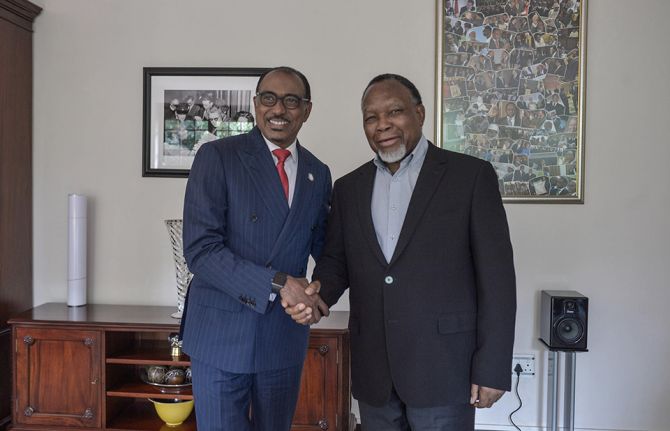
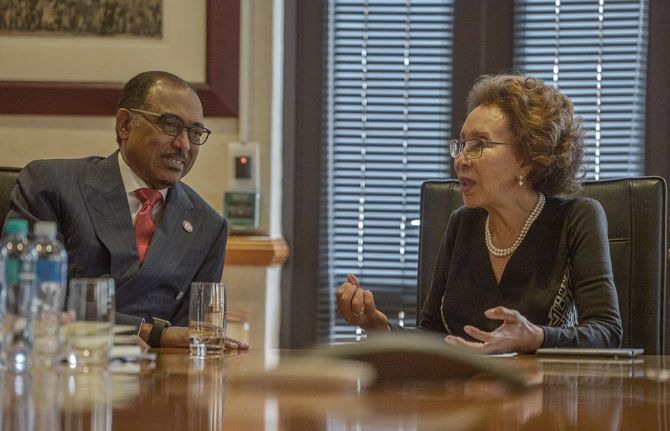

Feature Story
Keeping up the momentum in the global AIDS response
24 April 2019
24 April 2019 24 April 2019During a visit to South Africa, UNAIDS Executive Director, Michel Sidibé, has warned that the global AIDS response is at an inflection point, at which gains to date could easily be reversed unless urgent efforts are made to reach targets for 2020 and achieve ambitious goals for the decade beyond.
In a meeting with South Africa’s Minister of Health, Aaron Motsoaledi, Mr Sidibé congratulated the country on its progress made to date and encouraged the government to accelerate action to reach ambitious targets that will put the HIV response on a sustainable path to ending the AIDS epidemic by 2030. Mr Sidibé said it was time to fully leverage the power of communities to close the remaining gaps to the UNAIDS 90–90–90 treatment targets.
In a meeting with the First Lady of South Africa, Tshepo Motsepe, Mr Sidibé encouraged her to use her voice and outreach capacity to empower people who lacked visibility and access to services, particularly emphasizing the importance of adolescent girls to have access top the human papillomavirus vaccine to prevent cervical cancer.
Ms Motsepe indicated her willingness to engage on national and international issues for the sake of social development. “Health is not simply the absence of disease,” she said. “Some call me the First Lady, some call me the President’s spouse, but whatever you call me I am a social worker for South Africa.”
Mr Sidibé also met with former South Africa President Kgalema Motlanthe and urged him to keep people alert to the serious risks of losing momentum in the AIDS response and especially the need to engage more men in HIV testing and sustained treatment.
Mr Motlanthe, who is a member of the Champions for an AIDS-free Generation in Africa, expressed his appreciation for the efforts of Mr Sidibé over the course of his career, including as UNAIDS Executive Director. He noted that Mr Sidibé has repeatedly identified and advocated for crucial steps to advance the AIDS response.
“Your timing has always been spot-on,” he said.
While in Johannesburg, Mr Sidibé addressed the directors of UNAIDS country offices across eastern and southern Africa. He reminded them of the primary purpose of UNAIDS—to serve the needs of people living with HIV and those at risk of infection. As a health organization, he stressed that UNAIDS plays a unique role in advocating for the rights of vulnerable people, engaging strongly with civil society and insisting that nobody should face discrimination for how they live or who they love.
“UNAIDS is not an organization driven by logistics or materials,” he said. “It is an organization that puts people at the centre.”
“The AIDS response, especially in eastern and southern Africa, offers lessons and approaches to ensure sustainability through political leadership, resource mobilization and community engagement,” he continued.
“With people behind you, you can really make the world better.”
Region/country
Related
 Comprehensive update on HIV programmes in South Africa
Comprehensive update on HIV programmes in South Africa

25 February 2025

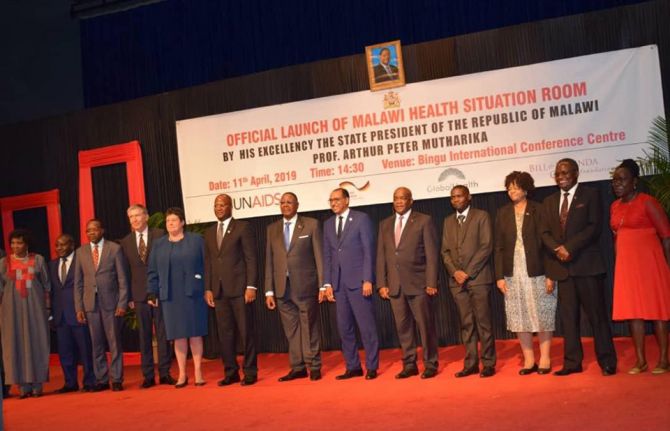
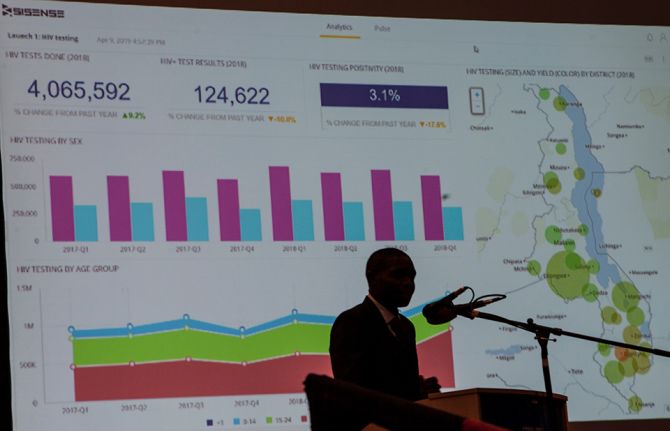
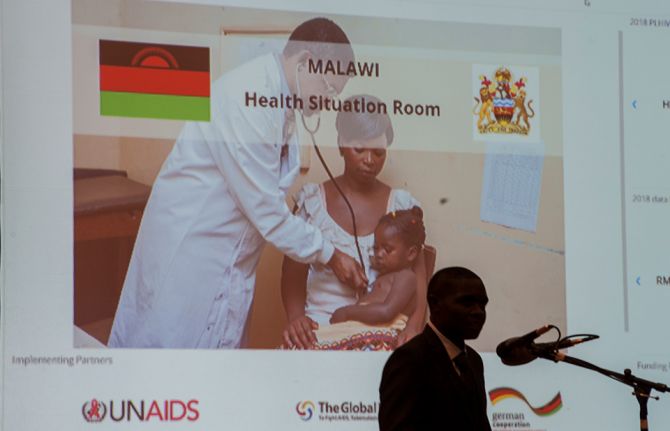
Feature Story
Malawi launches its health situation room
12 April 2019
12 April 2019 12 April 2019Malawi has become the latest country to launch a health situation room, a software platform designed to help the government make informed decisions about policies and programmes related to health, including HIV.
The innovative tool bolsters national information systems through real-time visualization of information from multiple data sets. It will enable leaders and programme managers to improve health programmes to achieve the 90–90–90 targets, whereby 90% of people living with HIV know their HIV status, 90% of people who know their HIV-positive status are accessing treatment and 90% of people on treatment have suppressed viral loads by 2020.
Malawi is making good progress in its response to HIV. In 2017, 90% of people living with HIV in the country knew their status, 71% of people living with HIV had access to treatment and 61% of people living with HIV had a suppressed viral load. Around 1 million people are living with HIV in Malawi, with new HIV infections in 2017 down by 40% since 2010. However, HIV infections among young women and adolescent girls aged 15–24 years remain high and account for more than one in four new infections per year.
In his speech at the launch of the health situation room in the capital, Lilongwe, the President of Malawi, Arthur Peter Mutharika, said the tool was an important step forward.
“The health situation room is a demonstration of my government’s commitment towards accountability and transparency,” said Mr Mutharika. “My desire is that the health situation room will show us where to focus to improve even further in our quest for a healthier Malawi.”
The Executive Director of UNAIDS, Michel Sidibé, said the launch would strengthen the country’s health sector.
“The health situation room is an important innovation as it shares real-time data to improve the understanding of the country’s HIV epidemic and other health challenges,” said Mr Sidibé at the launch. “It will guide Malawi’s response and help officials to close the gaps, ensuring that no one is left behind as the country gets on track to end the AIDS epidemic by 2030.”
Region/country
Related
 Zambia - an HIV response at a crossroads
Zambia - an HIV response at a crossroads

24 February 2025
 Status of HIV Programmes in Botswana
Status of HIV Programmes in Botswana

20 February 2025

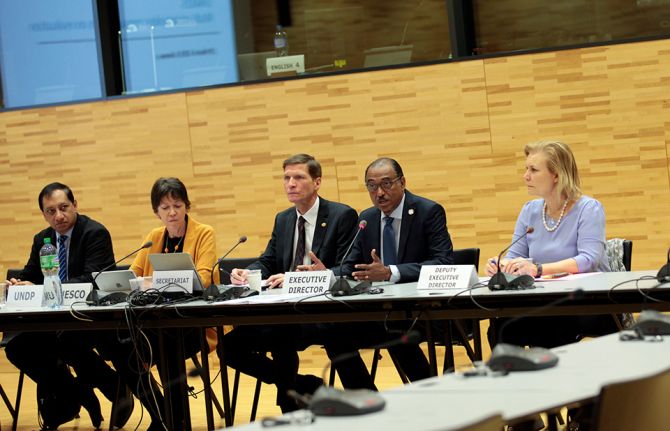
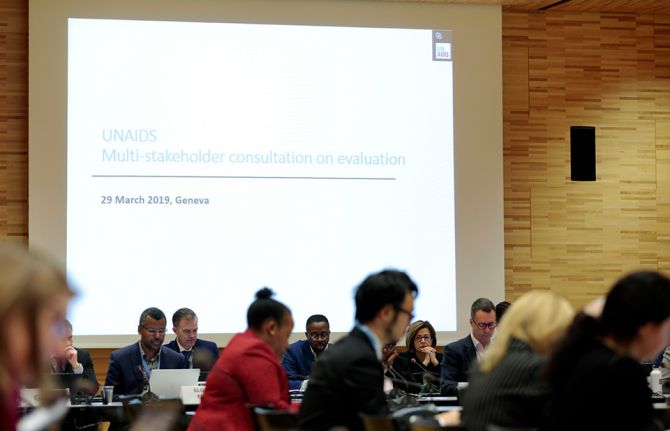
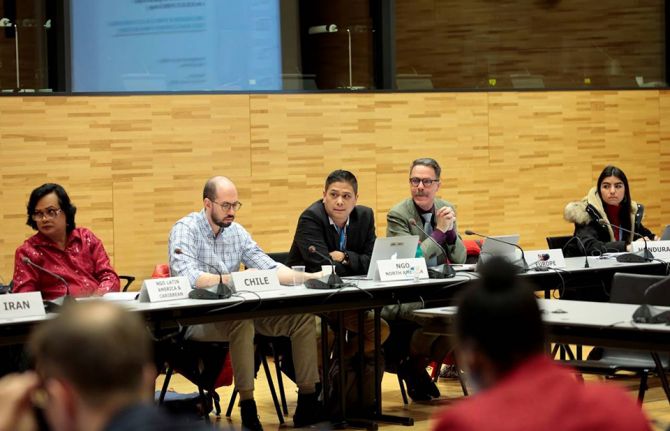
Feature Story
Learning lessons on evaluation
02 April 2019
02 April 2019 02 April 2019“The fact that something is hard to evaluate doesn’t make it impossible,” said Anna Downie, who leads on strategic information at Frontline AIDS. Reflecting on the challenge of evaluating advocacy, coalition-building, generating new partnerships and increasing the capacity of communities, she added, “To be successful, it is essential to allow space for innovation, to hear from communities about what is important to them and involve them from the outset so that you are looking for the same results and the evaluation is truly useful.”
Ms Downie was one of a number of experts who gathered in UNAIDS headquarters on 29 March in Geneva, Switzerland, for UNAIDS’ first consultation on evaluation. With the aim of informing the new UNAIDS evaluation policy, to be presented to the UNAIDS Programme Coordinating Board (PCB) meeting in June, the participants shared lessons they have learned while working on evaluation.
“Generating evaluations that are independent, credible and useful is the foundation of our work” said Susanne Frueh, the Chair of the United Nations Evaluation Group and Chair of the consultation.
The central role of countries in supporting a strong and independent evaluation function at UNAIDS was highlighted. The need for dedicated funding for evaluation, for the evaluation function to be independent and for transparency in the appointment of the head of the evaluation function were highlighted. The credibility and expertise of the staff of the office of evaluation, the establishment of an independent advisory committee and the need to protect the office from becoming politicized were also noted.
Michel Sidibé, UNAIDS Executive Director, highlighted the importance of the evaluation function. “We will not be able to transform or sustain our gains in the AIDS response if we don’t have clear learning from what we are doing. We will not be able to quicken the pace of action and help countries to scale up if we are not able to share our work and lessons learned,” he said.
The participants agreed that it is essential not only to ensure a strong gender and equity element in evaluations but also to measure what works and identify results in the areas of gender and human rights, which are cornerstones of the AIDS response. Triangulating data on human rights with civil society is a good way of ensuring that the evaluation provides a full picture. The importance of assessing the support provided by UNAIDS when major donors transition from countries was also highlighted.
In the medium to long term, the participants highlighted the need to build the capacity of young evaluators and to consider working with the growing number of evaluation companies from the global South.
The UNAIDS policy on evaluation is to receive a final round of comments from stakeholders soon. It will then undergo a peer review by the United Nations Evaluation Group before being presented to the UNAIDS PCB for endorsement.

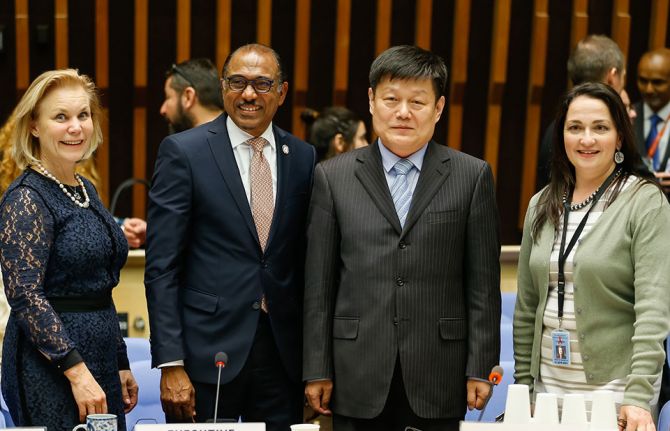
Press Release
UNAIDS presents a new plan to create a healthy, equitable and enabling environment for UNAIDS staff
01 April 2019 01 April 2019GENEVA, 1 April 2019—UNAIDS presented a new Action Plan to its Board members during a special session of the UNAIDS Programme Coordinating Board (PCB), held on 28 March 2019. The Action Plan sets out a series of priority areas that UNAIDS will be working on to create a positive organizational culture and increase the awareness of managers and staff of their accountability, rights and duties.
“We are transforming a difficult moment into a moment of opportunity,” said Michel Sidibé, Executive Director of UNAIDS. “Our Action Plan is transformative and will help us to create the model inclusive work environment that all of us at UNAIDS are committed to. This in turn will help us to be more effective as we work towards ending the AIDS epidemic.”
He reiterated that staff were UNAIDS’ greatest asset and stressed that the Senior Management Team was committed to change, accountability and transparency. He also said that the plan was designed with staff at the centre and that staff had played an instrumental role in contributing to and shaping the Action Plan.
During the meeting, the Board heard from Laurie Newell, Chair of the working group to strengthen the PCB’s monitoring and evaluation role on zero tolerance against harassment, including sexual harassment, bullying and abuse of power, at UNAIDS. Ms Newell explained that the working group will support UNAIDS in being a model organization in the United Nations system for zero tolerance for harassment and commitment to dignity and respect at work. The working group particularly appreciated the engagement of staff in the development of the Action Plan as a model for the United Nations system.
The Board members expressed their support for the Action Plan and urged UNAIDS to continue its implementation and its improvement. They expressed their wish to see the Action Plan become a pathfinder in the United Nations system to address harassment in the workplace. They also reiterated their support to the PCB working group and said that they looked forward to its recommendations at the PCB meeting in June.
The Board also heard from Yuri Ambrazevich, Permanent Representative of Belarus to the United Nations Office and other International Organizations in Geneva and Chair of the search committee for the selection of the next Executive Director of UNAIDS. He requested the support of the PCB in helping the search committee to ensure that the process remains fair and confidential for all candidates and solicited the Board’s support in bringing forward the broadest possible pool of highly qualified candidates. The Board confirmed its trust in the search committee and looked forward to the discussion of the proposed shortlist of candidates at the 44th meeting of the PCB, in June 2019.
UNAIDS Board members and representatives of United Nations Member States, international organizations, civil society and nongovernmental organizations attended the special session of the PCB, which was chaired by Li Mingzhu, Commissioner of the National Health Commission, China, with the United States of America serving as Vice-Chair and Belarus as Rapporteur.
The UNAIDS Executive Director’s report to the Board and the Board’s decisions can be found here.
UNAIDS
The Joint United Nations Programme on HIV/AIDS (UNAIDS) leads and inspires the world to achieve its shared vision of zero new HIV infections, zero discrimination and zero AIDS-related deaths. UNAIDS unites the efforts of 11 UN organizations—UNHCR, UNICEF, WFP, UNDP, UNFPA, UNODC, UN Women, ILO, UNESCO, WHO and the World Bank—and works closely with global and national partners towards ending the AIDS epidemic by 2030 as part of the Sustainable Development Goals. Learn more at unaids.org and connect with us on Facebook, Twitter, Instagram and YouTube.
Related information
Press centre
Download the printable version (PDF)
Related
55th meeting of the UNAIDS Programme Coordinating Board
10 December 2024
20th Indian Ocean Colloquium on HIV/AIDS
22 October 2024
University of Pompeu Fabra
17 October 2024
Linking UN Summit of the Future with COP29
26 September 2024
Revitalized Multilateralism
24 September 2024
Plenary debate of the Summit of the Future
23 September 2024
African Union Year of Education
23 September 2024
AIDS2024 opening session
22 July 2024
Forum on China–Africa Cooperation Symposium
09 July 2024

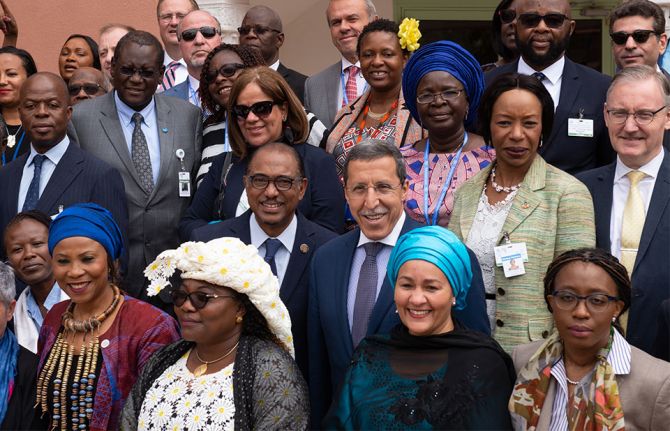
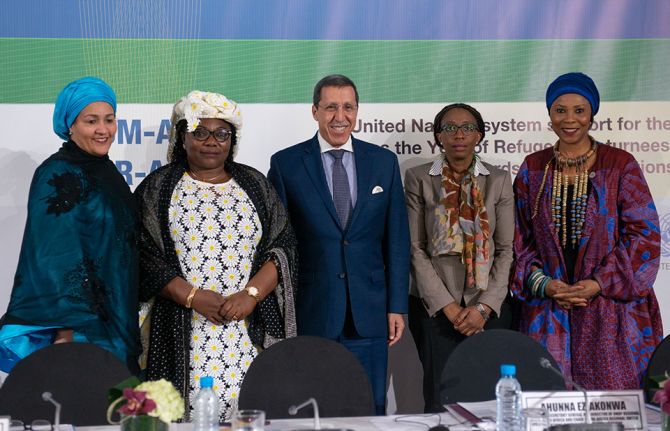
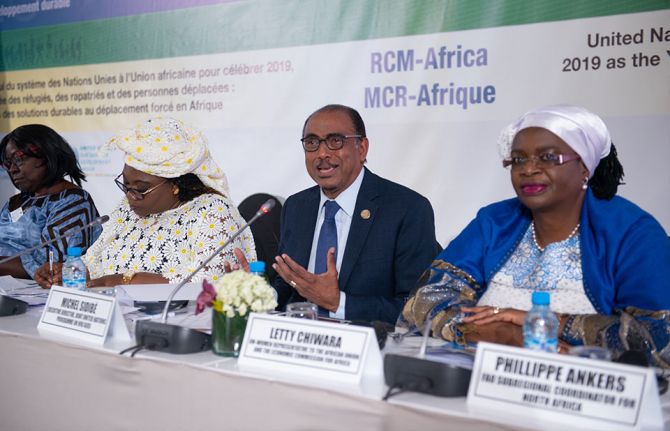
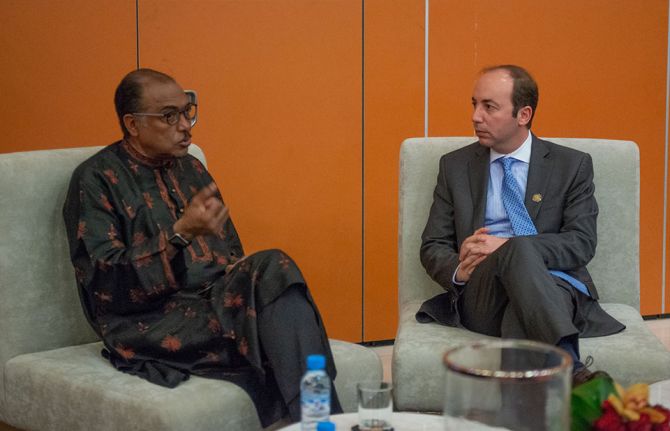
Feature Story
UN and AU working together for sustainable development
27 March 2019
27 March 2019 27 March 2019“We cannot have sustainable development without sustaining peace. Neither can we build a secure future for everyone without addressing the root causes of our conflicts and vulnerabilities,” said Amina Mohammed, the United Nations Deputy Secretary-General.
Ms Mohammed was speaking in Marrakech, Morocco, at the twentieth session of the Regional Coordination Mechanism for Africa (RCM–Africa)―a joint United Nations and African Union body that supports African development.
“The United Nations is working with the Africa Union to try to get the 47% of people of the continent still under the poverty line out of poverty, bring energy to the doorsteps of 500 million people without electricity and garner the US$ 60 billion needed to empower African women,” said Vera Songwe, the Executive Secretary of the United Nations Economic Commission for Africa.
The African Union Commissioner for Human Resources, Science and Technology, Sarah Anyang Agbor, encouraged the participants to, “Live by Ubuntu. It is my, your, our responsibility to strengthen collaboration for the reforms.”
Michel Sidibé, the Executive Director of UNAIDS, co-chaired a panel meeting with Ms Anyang Agbor at the RCM–Africa session. During the panel meeting―entitled “Upscaling durable solutions, including addressing the forced displacement–development nexus”―the participants noted that more than a third of the world’s displaced people are in Africa. The participants agreed on the need to understand and address the root causes of displacement and build on what is known to work to break the cycle of vulnerability. Mr Sidibé emphasized that fostering resilient societies means first addressing the challenge of income inequality.
The RCM–Africa session was held on 23 and 24 March.
Region/country
Related
 Government ensures continuity of treatment in Malawi
Government ensures continuity of treatment in Malawi

10 February 2025

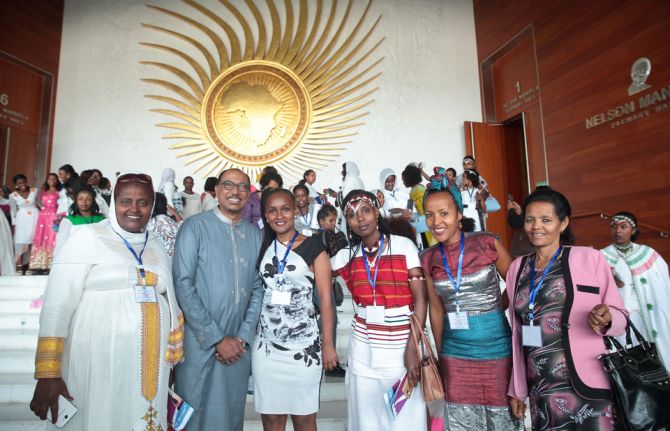
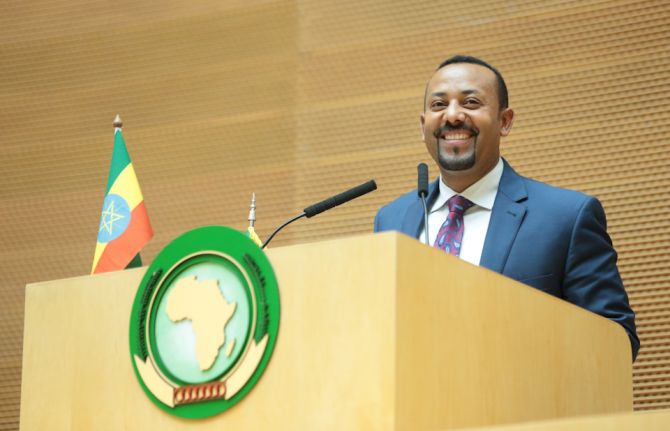
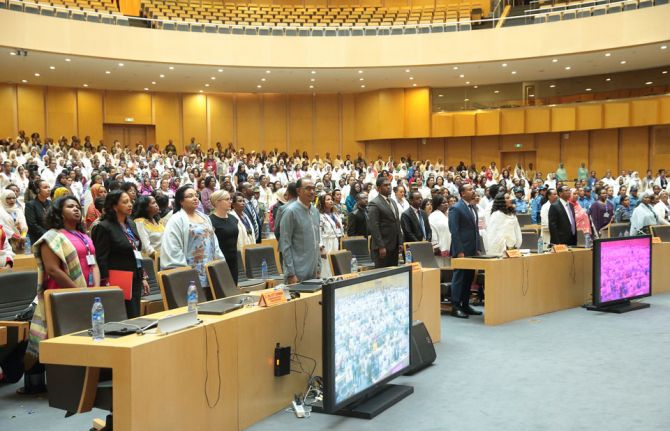
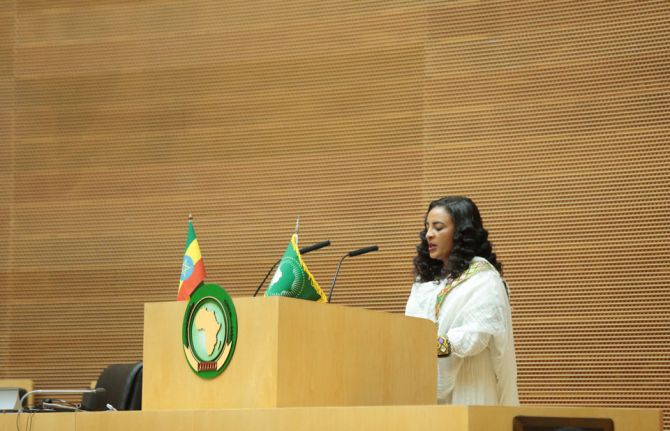
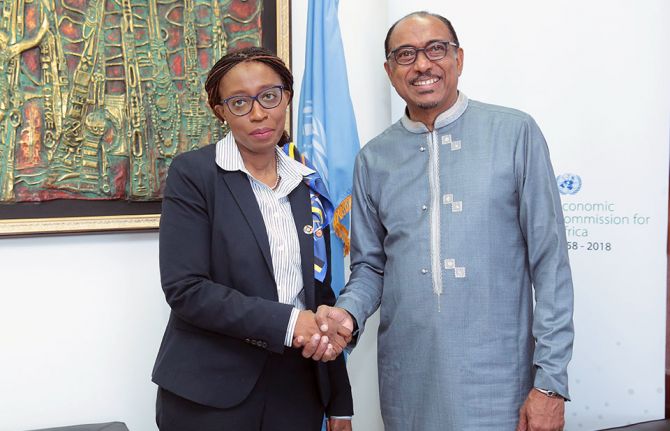
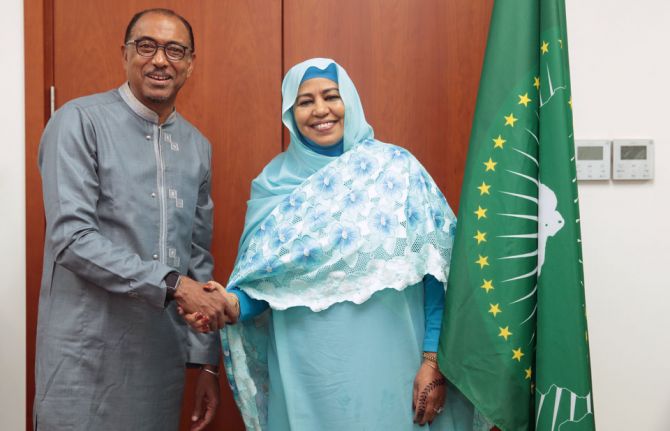
Feature Story
International Women’s Day in Ethiopia
12 March 2019
12 March 2019 12 March 2019The UNAIDS Executive Director, Michel Sidibé, celebrated International Women’s Day in Addis Ababa, Ethiopia, at an event organized by the Ministry for Women, Youth and Children Affairs and supported by UNAIDS. The event brought together female leaders and representatives of women’s associations from all over the country. Addressing the meeting, the Prime Minister of Ethiopia, Abiy Ahmed, emphasized that women are the “pillars of the nation.”
Yalem Tsegaye, the Minister of Women, Children and Youth Affairs, outlined the Jegnit initiative. Jegnit means “heroine” and is an innovative movement led by the Government of Ethiopia to empower and bring more women to leadership positions, both at the community and political levels.
During the event Mr Sidibé congratulated the Prime Minister and the Government of Ethiopia for its bold reforms in addressing the gender gap by appointing women to leadership positions in all sectors. He commended the Prime Minister for ensuring gender parity in his Cabinet.
“It is time to empower women and girls, because ending AIDS is as much about righting power imbalances as it is about health. This means prioritizing girls and young women in true partnership with them. It means providing adolescents girls and young women with more options and real choices,” said Mr Sidibé.
While in Addis Ababa, Mr Sidibé met with Vera Songwe, Executive Secretary of the United Nations Economic Commission for Africa, the first woman to hold the post in 60 years, to discuss ongoing collaboration on sustainable AIDS responses across the African continent.
Mr Sidibé also met with Amira Elfadil of the Department of Social Affairs of the African Union. In 2019, UNAIDS and the African Union are celebrating 20 years of a partnership focused on ending the AIDS epidemic across Africa.
Region/country
Related
 Zambia - an HIV response at a crossroads
Zambia - an HIV response at a crossroads

24 February 2025
 Status of HIV Programmes in Botswana
Status of HIV Programmes in Botswana

20 February 2025
Related
 UNAIDS calls for rights, equality and empowerment for all women and girls on International Women’s Day
UNAIDS calls for rights, equality and empowerment for all women and girls on International Women’s Day

06 March 2025
55th meeting of the UNAIDS Programme Coordinating Board
10 December 2024
UNAIDS data 2024
02 December 2024
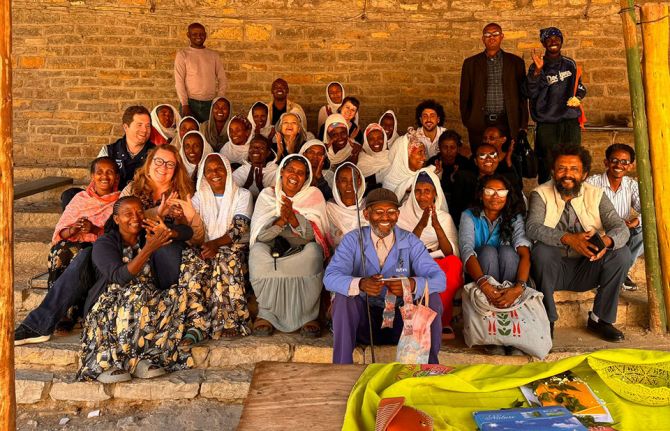 Resilience amid crisis: strengthening the HIV response for displaced communities in Ethiopia
Resilience amid crisis: strengthening the HIV response for displaced communities in Ethiopia

02 December 2024
Take the rights path to end AIDS — World AIDS Day report 2024
26 November 2024
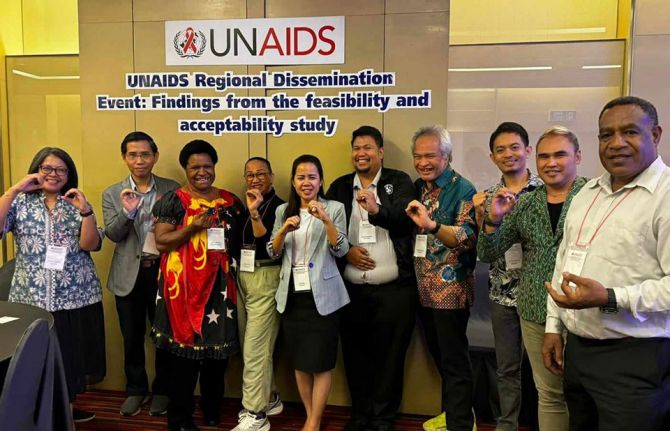 PrEP for her: Cambodia, Indonesia, Papua New Guinea and the Philippines prepare to introduce the Dapivirine ring to help prevent HIV
PrEP for her: Cambodia, Indonesia, Papua New Guinea and the Philippines prepare to introduce the Dapivirine ring to help prevent HIV

22 November 2024
20th Indian Ocean Colloquium on HIV/AIDS
22 October 2024

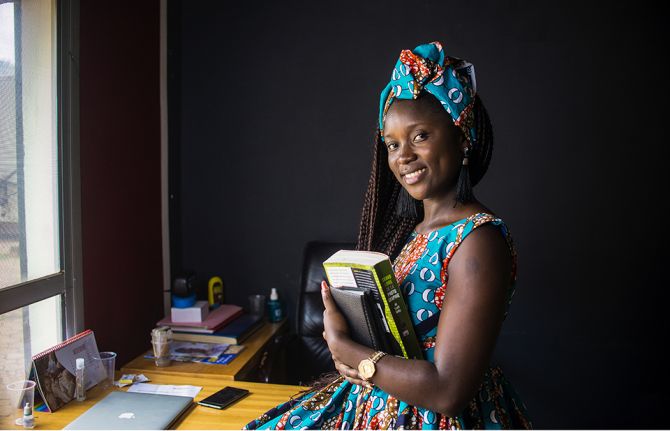
Press Statement
On International Women’s Day, UNAIDS calls for greater action to protect young women and adolescent girls
08 March 2019 08 March 2019Every day, 460 adolescent girls become infected with HIV and every week 350 adolescent girls die of AIDS-related illnesses
GENEVA, 8 March 2019—On International Women’s Day, UNAIDS is urging countries to step up and protect young women and adolescent girls from HIV.
AIDS-related illnesses remain the leading cause of death for women aged 15–49 years globally. In 2017, 66% of new HIV infections among 10–19-year-olds were among females globally—in eastern and southern Africa, 79% of new HIV infections among 10–19-year-olds were among females.
“There is a vicious cycle of gender inequities, gender-based violence and HIV infection in many parts of the world,” said Michel Sidibé, Executive Director of UNAIDS. “Oppression and power imbalances must be redressed and harmful masculinities addressed in order to ensure that women and girls have full control over their sexual health and rights.”
Much more needs to be done to reach young people with HIV prevention, treatment and care. Young women and adolescent girls are especially being left behind. Gender-based violence, sexual exploitation and drug use are among the many factors that can increase the vulnerability of young women and adolescent girls to HIV.
Efforts to end AIDS are undermined where the human rights of young women and adolescent girls—especially their sexual and reproductive health and rights—are not supported. Countries must therefore enact laws and policies that enable access to services, including health and social protection, by young women and adolescent girls, helping them to claim their right to health.
International law gives people, including young women and adolescent girls, the right to access services to protect their sexual and reproductive health. However, 45 countries worldwide still have laws that require people under the age of 18 years to obtain the consent of their parents in order to be tested for HIV.
Social protection, education—including comprehensive sexuality education—and HIV prevention services that are integrated with sexual and reproductive health services have been shown to improve the health of, and empower, young women and adolescent girls. A South African study showed that HIV prevalence among girls who had finished high school was about half that among girls who had not (8.6% versus 16.9%). Children who access universal primary education in Botswana, Malawi and Uganda have been shown to have similar outcomes.
Investing in education. Investing in HIV and other health services. Preventing and protecting women and girls from violence. Eradicating harmful practices such as early, forced and child marriage. Promoting women’s rights. Through these actions young women and adolescent girls can be protected from HIV and the world can build towards ending AIDS by 2030.
UNAIDS
The Joint United Nations Programme on HIV/AIDS (UNAIDS) leads and inspires the world to achieve its shared vision of zero new HIV infections, zero discrimination and zero AIDS-related deaths. UNAIDS unites the efforts of 11 UN organizations—UNHCR, UNICEF, WFP, UNDP, UNFPA, UNODC, UN Women, ILO, UNESCO, WHO and the World Bank—and works closely with global and national partners towards ending the AIDS epidemic by 2030 as part of the Sustainable Development Goals. Learn more at unaids.org and connect with us on Facebook, Twitter, Instagram and YouTube.
Contact
UNAIDS GenevaAnne-Claire Guichard
tel. +41 22 791 2321
guicharda@unaids.org
UNAIDS Media
tel. +41 22 791 42 37
communications@unaids.org
Press centre
Download the printable version (PDF)









